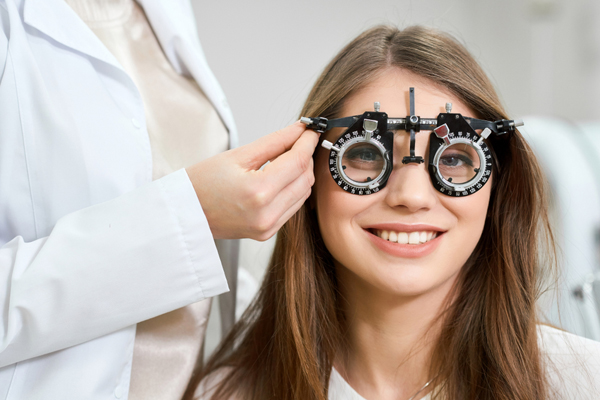Prescription Glasses FAQs

More often than not, people find they need some form of visual aid at a certain point in life, and while some people prefer contact lenses or surgery, prescription glasses are a tried and true method. Prescription glasses are effective visual aids that significantly improve a person's ability to see things by focusing on specific areas of weakness in a person's vision.
They usually consist of glass that is uniquely curved. The details of the curve are part of the prescription that the optometrist gives the patient. If you are finding it difficult to read or see at distances, then prescription glasses may be the solution for you.
Enhance your vision
Glasses improve a person's vision by focusing images in the proper place on the retina. The retina is responsible for reacting to light that comes into the eye and relaying the data to the brain, which creates the images the person sees. In order for these images to be clear, three important things need to occur:
- The image produced by the brain fits into the retina
- The light entering the retina is focused on the surface
- The curves created by the image match the curves in the retina
Prescription glasses can help to account for any eyesight issues the patient has. Even though there are cheap store-bought reading glasses and other products available, they will not be nearly as effective as a customized pair of prescription glasses.
How prescription glasses work
Each eye contains a lens that lies between the pupil and the retina. The lens works with the cornea, which is the transparent cover on the eye. Together, they focus the image on the surface of the retina. One vision issue that people may struggle with occurs when the image focused on the retina is sent too far back. This can lead to farsightedness, while the image going too far forward can lead to nearsightedness.
Prescription glasses can effectively correct these issues, as well as others, like astigmatism. Astigmatism is a condition in which the cornea does not have the proper shape. People with this type of eyes are unable to focus properly, which can sometimes lead to double vision and blurriness. Experts can use prescription glasses to help a patient's eyes work past these issues in order to see more clearly.
Different types of prescription glasses
There are two types of glasses commonly prescribed by optometrists: minus and plus lenses.
Minus lenses
Minus lenses have a concave shape. They are used to focus images in the proper part of the retina when a person's natural lens and cornea focus the image too close (nearsightedness).
Plus lenses
Plus lenses have a convex shape and are used when the patient's eye focuses the image too far back into the retina (farsightedness). The strength of the prescription given by the optometrist determines how much the lenses alter the focus of the images being sent to the retina.
Common myths about prescription glasses
While there are many myths and misconceptions about these visual aids, two main ones are:
1. Glasses weaken the eye
The only way in which prescription glasses may cause some issues to the patient is if the patient wears a pair of glasses with a different prescription. In general, glasses will not have a negative effect on the patient's eyes if they follow the proper instructions. With prescription glasses, it is possible to enhance one's eyesight with glasses for conditions such as presbyopia, astigmatism, farsightedness, and nearsightedness.
However, there is one exception to this rule. The glasses prescribed to young children with lazy or crossed eyes can help to straighten their eyes. Not treating either issue can lead to a permanent condition.
2. Wearing the wrong prescription can damage the eyes
Strictly speaking, this is not true, but it will fail to correct the person's vision problems and usually lead to blurry vision. Wearing glasses with the wrong prescription can also lead to mild headaches, but it does not damage a person's eyes in any way.
Frequently asked questions about prescription glasses
Thinking about getting prescription glasses? Let us go over some frequently asked questions:
1. How often should I replace my prescription glasses?
Most people need to replace their prescription glasses every two years, although this may vary depending on your individual vision needs. If you find that your vision has changed or your glasses are no longer comfortable, it is time to get a new pair.
2. How do I know if my prescription has changed?
If you notice that you are having trouble seeing clearly with your current glasses, it is an excellent idea to get an eye exam to see if your prescription has changed. Sometimes, a change in prescription can be subtle, so it is crucial to keep an eye on your vision and consult with an optometrist or ophthalmologist if you have any concerns.
3. I just got new glasses, and they are giving me a headache. What should I do?
It is not unusual to suffer headaches or eyestrain when you first start wearing new prescription glasses. This is usually because your eyes are adjusting to the new lenses. However, if the headaches persist, consult with an eye doctor to ensure that the glasses are the right prescription for you.
4. Can I wear contact lenses if I have a prescription for glasses?
Yes, you can use contact lenses even if you have a prescription for glasses. In fact, many people choose to wear contacts for convenience or aesthetic reasons. If you are contemplating switching from glasses to contacts, consult with your eye doctor to find the best option for you.
Explore prescription glasses
Thinking about getting prescription eyewear? Call or visit our Mt Vernon clinic to set up an appointment.
Request an appointment here: https://brighteyesmv.com or call Bright Eyes Optometry at (914) 668-1429 for an appointment in our Mt Vernon office.
Check out what others are saying about our services on Yelp: Read our Yelp reviews.
Recent Posts
Emergency eye care is needed if you find yourself dealing with a problem with your eye that causes pain or affects your vision. Failing to treat eye injuries as soon as they are detected can lead to permanent consequences, like reduced vision or blindness. Common eye injuries that require emergency eye care include: Exposure to…
Looking for more information on eye protection? An ophthalmologist knows everything there is to know about protecting the eyes. While there are a few different types of eye care professionals, ophthalmologists are eye care professionals who have undergone additional years of education and training so they can offer their patients both medical and surgical eye…
Controlling myopia at an early age can slow down its progression. This can help prevent yearly upgrades for stronger glasses. Your optometrist can help by offering various treatments. If you want to find out how your optometrist can help control myopia, here are the details.Optometrists use atropine eye drops to achieve short-term myopia control results.…
Another word for an itchy eye is ocular pruritis. It is a common health situation in many people. Itchiness in your eyes is more than enough reason to see an optometrist. Receiving prompt treatment is important in receiving prompt relief. If you want to know what causes an itchy eye and the treatments for it,…



